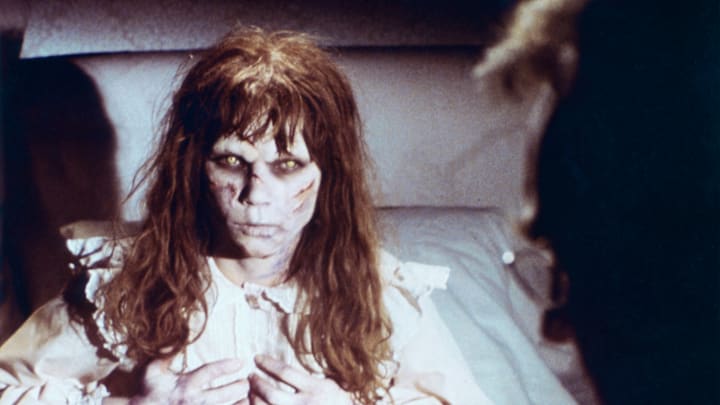The Lumière brothers were said to have caused quite a stir when their 50-second short film, The Arrival of a Train at La Ciotat, premiered in Paris in 1896. Audiences, who were unaccustomed to the sensory experience of moving footage, experienced a jolt of panic when an oncoming train seemed to be speeding directly toward them.
Over the years, the story has morphed into people fleeing from the theater entirely, though that’s not likely. Since the Lumières, however, many filmmakers have been successful in driving moviegoers out of their seats. The latest additions: Presence, a Steven Soderbergh film about a ghostly apparition that’s apparently too tense for some filmgoers. A Variety journalist observed at least two quick exits at the 2024 Sundance Film Festival, including one who said, “I cannot take this stress so late at night.”
Another Sundance audience displeaser: Sasquatch Sunset, which apparently depicts the monster of folklore moving his bowels. Twelve members of the press exited within the first half-hour.
Here are eight other films that couldn’t keep audiences in the dark for long.
1. The Exorcist (1973)
Lines wrapped around the block for the film adaptation of William Peter Blatty’s bestselling novel about a young girl possessed by a demon. They quickly realized it was the cinematic equivalent of a hot pepper: something to be endured rather than enjoyed. News footage portrayed stricken filmgoers who had fled screening rooms out of sheer terror; one fainted in the lobby. “I just found it really horrible and had to come out,” said one audience member. “I couldn’t take it anymore.” By the time the film premiered in London, ambulances were parked outside.
2. The Blair Witch Project (1998)
Launching the found-footage genre with an economical story about filmmakers threatened by an unseen supernatural force, The Blair Witch Project was a sizable box office hit and remains one of the most profitable films ever ($22,000 budget, $240 million gross). But the documentary-style format, with actors jogging or falling over with a camera in hand, prompted waves of people getting motion sickness in aisles, lobbies, and bathrooms. Atlanta-area theaters were reported on puke patrol for most of opening weekend. “Someone threw up in the men’s restroom, the women’s restroom, and in the hallway,” said a theater manager. “It's not pleasant to clean up.” In Cambridge, Massachusetts, another theater manager made announcements before screenings to please vomit outside of the screening room.
By the time Cloverfield's (2008) handheld photography was churning stomachs a decade later, theaters wisely posted signs warning of a "roller coaster" effect. Instead of barf bags, theaters handed out refunds.
3. 127 Hours (2010)
From the get-what-you-pay-for department: Audiences that streamed in for director Danny Boyle’s account of hiker Aron Ralston, who got himself wedged in a cave and had to amputate his own arm with a pocketknife, found themselves bearing witness to James Franco wedged in a cave and amputating his own arm with a pocketknife. Many, many people fainted; some vomited; one person fainted, was hauled away in an ambulance, and returned to the theater to declare the film “excellent.”
4. Reservoir Dogs (1992)
It’s not necessarily shocking that the unflinching violence of a Quentin Tarantino movie would prompt audience evacuations: 1994’s Pulp Fiction lost patrons when Uma Thurman got a shot of adrenaline in her heart. But Reservoir Dogs is notable for the people it pulled from their seats. When Michael Madsen’s character began an unsolicited ear amputation of a hostage during an industry screening, the late Wes Craven (creator of The Last House on the Left and A Nightmare on Elm Street) reportedly fled the theater.
5. Freaks (1932)
Tod Browning’s infamous portrayal of a circus sideshow with revenge in mind was a harrowing experience for filmgoers. Not strictly a horror film, its large cast of “actual” circus performers was unsettling. Freaks suffered mass walkouts upon release, as viewers were unnerved by missing limbs; MGM insisted on editing the film after a woman claimed she was so aggrieved during a screening that she suffered a miscarriage.
6. Irréversible (2002)
Panned for its depiction of a brutal assault, this revenge film from director Gaspar Noé prompted viewers to head for the exits—but not necessarily because of what was shown onscreen. Noé admitted to using a 27 hertz frequency of bass that can’t be picked up by the human ear during the movie’s first 30 minutes. Known as infrasound, it's been known to induce panic and anxiety in a manner similar to vibrations created by earthquakes. Paranormal Activity (2007) used a similar technique.
7. The Lion King (1994)
In the proud Disney tradition of maiming parents came The Lion King, where tiny Simba learns to fend for himself after his father is trampled during a stampede. The animated tragedy proved so intense for younger viewers—Disney’s key demographic—that they had to be temporarily relocated to the lobby until they calmed down.
8. The Walk (2015)
In the 2008 documentary Man on Wire, modern audiences met Philippe Petit, a rope walker who caused a stir in 1974 New York for traipsing between the Twin Towers. In 2015, director Robert Zemeckis (Back to the Future) dramatized the feat with The Walk, starring Joseph Gordon-Levitt as Petit. Unlike the documentary, which relied mainly on still photos and reenactments, Zemeckis used digital artistry to put the viewer on the rope with Petit—in IMAX, no less. The result was so dizzying that audience members prone to vertigo suffered anxiety and even vomiting.
A version of this article was originally published in 2015; it has been updated for 2024.
